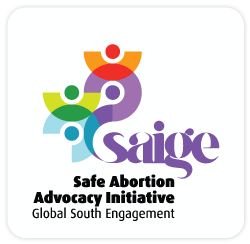This is a statement by the Safe Abortion Advocacy Initiative Global South Engagement (SAIGE) in commemoration of September 28 International Safe Abortion Day. This statement was delivered by the Asian Pacific Resource & Research Centre for Women (ARROW) at the Annual discussion on the integration of a gender perspective throughout the work of the Human Rights Council and that of its mechanisms. Download the full statement here.
Let’s Make Unsafe Abortion History
Between 2015-2019, 73.3 million abortions occurred worldwide each year. Of these, 1 out of 3 were carried out in the least safe or dangerous conditions. Over half of all estimated unsafe abortions globally were in Asia, most of them in South and Central Asia. Likewise, 3 out of 4 abortions that occurred in Africa and Latin America were unsafe. In developing countries, about 7 million women are admitted to hospitals every year as a result of unsafe abortion. Each year, between 4.7 – 13.2% of maternal deaths can be attributed to unsafe abortion.1
Laws and policies play a critical role in contributing to or alleviating the barriers in accessing safe abortion services. Safe abortion rights advocates and activists globally have articulated over and over that restrictive laws on abortion does not only have a negative impact on public health, but also on social justice. Rather than making abortion safer or improving health and lives, criminalisation of abortion leads to less safe abortions and worse health outcomes and thus perpetuates gender stereotypes and abortion stigma. The likelihood of ill-health and legal risk is greatly heightened for marginalised groups of pregnant persons.2 Despite the evidence of this harmful approach, criminalisation of abortion remains prevalent in the Global South.
Moreover, recognition of safe abortion as a part of essential healthcare has been under question since the onset of the COVID-19 pandemic. Access to safe abortion services were severely impeded in many countries in the Global South. These conditions unfairly impacted the most vulnerable groups of pregnant persons. Positively, abortion was confirmed as an essential healthcare service by the World Health Organization (WHO) last June 2020, wherein governments can support SMA via telemedicine. Self-managed abortions (SMA) occur when a person chooses to perform their own abortion outside a medical setting. WHO has recognized SMA as important to the optimal use of healthcare resources and to the empowering role it plays, which is vital during a period when pregnant persons are otherwise facing higher levels of discrimination. Pregnant persons choose to self-manage their abortions for various reasons and this needs to be protected, in line with the principle of bodily autonomy and trusting women’s reproductive choices.3
As advocates, we call upon all states and governments to recognise the reproductive health rights and ensure universal access to quality safe abortion services and post-abortion care for pregnant people. We call for abortion decriminalisation and the adoption of legal frameworks that enable pregnant persons to exercise their right to bodily autonomy, health and life.
1 WHO. Preventing unsafe abortion. <https://www.who.int/news-room/fact-sheets/detail/preventing-unsafe-abortion>
2 SAIGE. Decriminalisation of Abortion. Retrieved from <>
3 SAIGE. Self-managed abortions. Retrieved from <>
